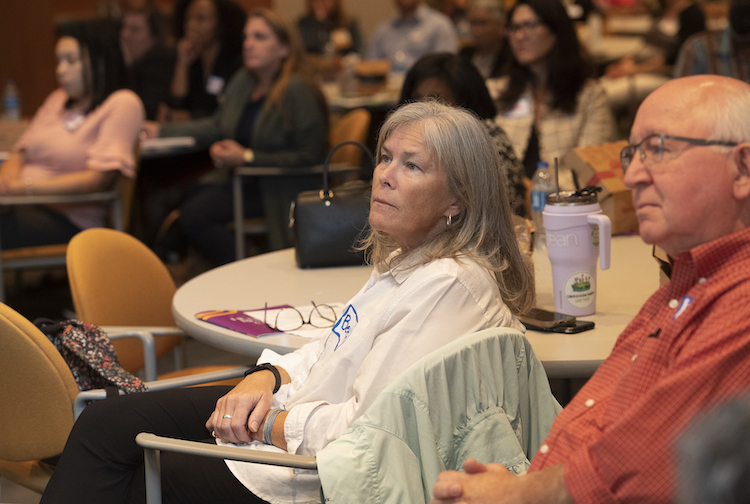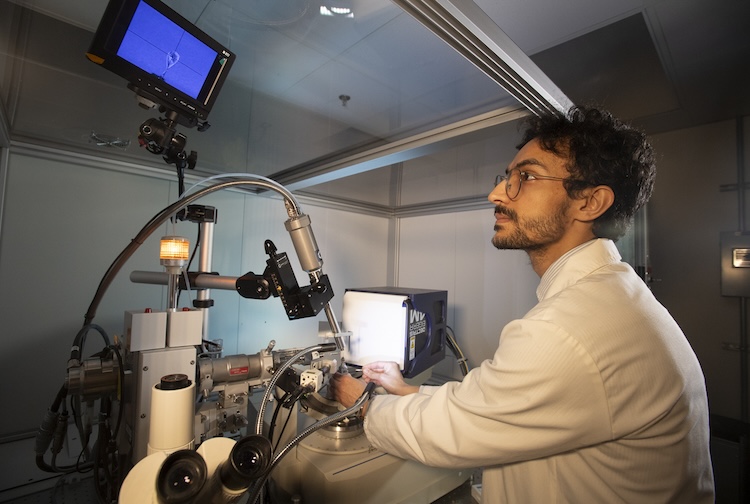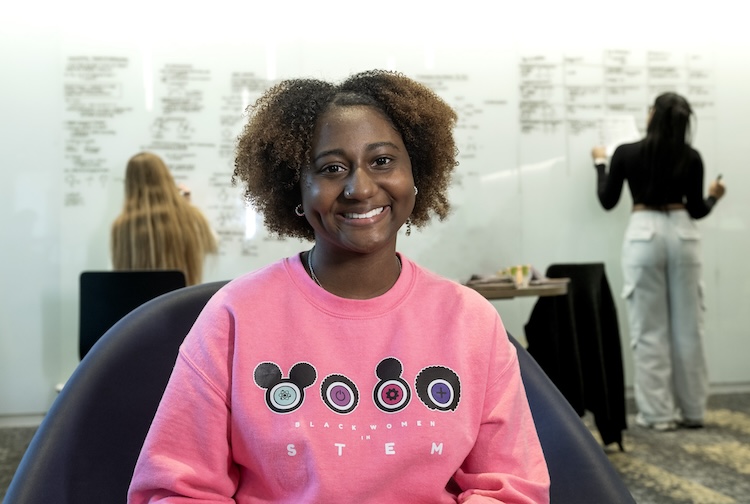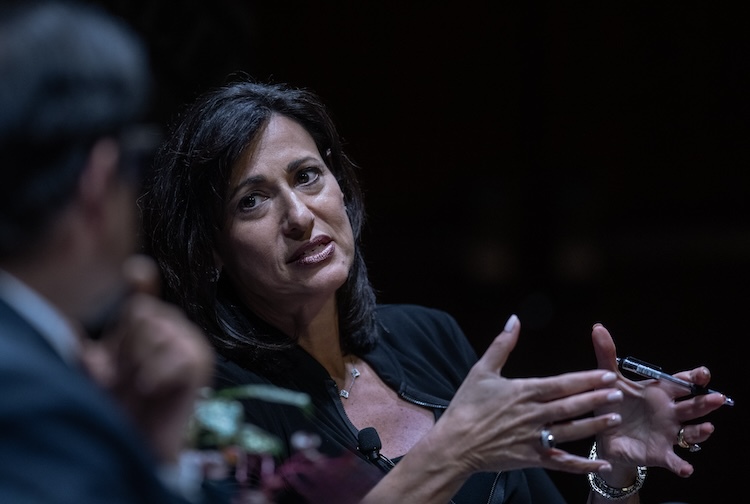
Bringing to light health disparities in the community and on campus, VCU hosts second History and Health Symposium
Professionals from diverse health disciplines explore the historical underpinnings of current health disparities.
October 13, 2023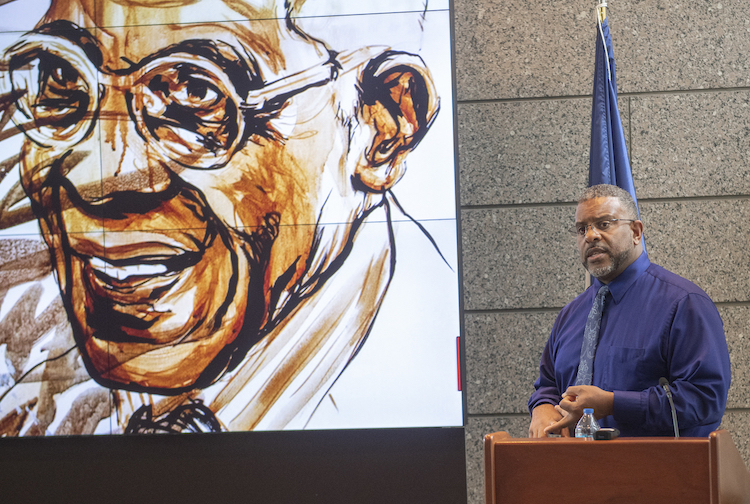 Jason E. Glenn, Ph.D., captivates the audience at the 2023 History and Health Symposium as he explores the profound impact of the humanities by addressing health inequities during his lecture. (VCU Enterprise Marketing and Communications)
Jason E. Glenn, Ph.D., captivates the audience at the 2023 History and Health Symposium as he explores the profound impact of the humanities by addressing health inequities during his lecture. (VCU Enterprise Marketing and Communications)
By Jayla Parker
Learning from the past to improve the future of health care is one of the many goals faculty, medical professionals and students have across Virginia Commonwealth University and VCU Health. Engaging the community in this process is crucial to understand the needs and systemic gaps facing patients to ensure all are cared for and treated respectfully in health care settings.
The 2023 History and Health Symposium, held on Sept. 27 at the Library of Virginia, serves as a yearly opportunity to share this knowledge.
Hosted by the Office of Health Equity and the Health Humanities Lab at the Humanities Research Center, and sponsored by the School of Dentistry and School of Medicine at Virginia Commonwealth University, this year’s symposium aims to explore the history of medicine and connections to current health inequities and disparities across a variety of health professions disciplines.
“This program provides a link between our history and the current effects of health inequities and disparities. It provides a forum for all to learn, to reflect and to have an impact on the future of healthcare,” said Kevin Harris, senior associate dean for Diversity, Equity and inclusion in the VCU School of Medicine.
The symposium kicked off with a lecture from Jason E. Glenn, Ph.D., an associate professor in the Department of History and Philosophy of Medicine and Executive Director of the REPAIR Project at the University of Kansas Medical Center, and Community Spotlight panels featuring leaders from Richmond, and VCU and VCU Health.
“To understand the origins of racism and address health inequities, we have to understand the history of racism as the major social and structural determinant of health in the United States,” Glenn said.
Participants actively participate in thought-provoking discussions at the 2023 History and Health Symposium. (VCU Enterprise Marketing and Communications)
The Community Spotlight panels discussed two high profile topics within health care and the Richmond community: Black maternal health and the East Marshall Street Well Project.
According to the Center for Disease Control and Prevention, hundreds of people die during pregnancy or in the year after giving birth each year in the United States. Black women are three times more likely to die from a pregnancy-related cause than white women.
“The central problem is that there is an excessive amount of pregnancy related deaths in the United States,” said panelist Terri Erwin, new leadership engagement organizer of the Virginia Interfaith Center for Public Policy. “And the general understanding now is that systemic racism is actually the driver of this exaggerated number of Black maternal deaths.”
One method of spreading more awareness about how systemic racism can affect Black mothers is through educational programming. The Office of Health Equity, in collaboration with the Health Humanities Lab, created modules — available to anyone on the internet including people outside of VCU and VCU Health — that allow participants to delve into the history of maternal health and efforts to make it more equitable for all mothers. The History and Health; Equitable Access to Care series also touches on other health care topics including AI discrimination, racial disparities in pain management and inequities of climate change and health.
The East Marshall Street Well Project includes members of the Family Representative Council and VCU working together to correct tragic incidents that occurred in the past.
In April 1994, human bones and artifacts, mainly of African descent, from the 19th century were discovered in an abandoned well uncovered during construction on VCU’s MCV campus. The goal of this project is to ensure that the remains found on VCU’s campus and surrounding areas will receive appropriate study, memorialization and reburial.
“These remains were used for medical students to learn anatomy,” said panelist Stephanie Smith, a member of the Family Representative Council of the East Marshall Street Well Project. “When that was finished, the bodies were thrown into a pit with other trash. These are human remains. These are people who had families, hopes and dreams. They never had a memorial service. They never received dignity or respect.”
A group of 11 VCU Health Humanities Lab undergraduate and graduate fellows and researchers from the College of Humanities and Sciences are working to support the East Marshall Street Well Project, with Daniel Sunshine, Ph.D., and Maggie Unverzagt Goddard, Ph.D., overseeing the lab’s oral history and memorialization efforts.
This fall, they will also be sharing what they’ve learned so far on the project with VCU students and community members.
This was the second year of the symposium. Organizers hope to coordinate future events to continue these discussions and to identify ways to create positive change in health care communities. Attendees also earned a digital badge that they can use in their email and digital resumes.

